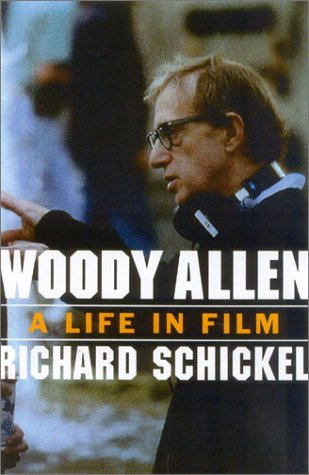
Like anyone gives a damn, right? Well too bad, it's my site and I talk about Woody from time to time.
This volume is a book-length interview with Woody Allen, one of the most controversial, misunderstood, challenging, stimulating and sometimes exasperating directors of all time. To me Woody is everything a great artist should be: funny, thoughtful and risk-taking.
Interviewer Richard Schickel begins the proceedings with a lengthy introduction to Woody and his films. This is a man that is prepared for the job. Perhaps more so than any other human being could have been. He's a Woody Allen enthusiast and has been all along and he's been an acquaintance of the director for many years as well.
And Schickel really knows his stuff. He watched every Woody Allen film again prior to the Interview. His guns were loaded, so to speak. And he's one hell of a writer with a tremendous amount of insight into the life and creative process of his subject. Schickle delves deep into the metaphors and subtexts of the career of Woody Allen, but unlike so many other so-called film scholars, the writing is never dull and it's very down to earth and easy to digest. He doesn't try to impress the reader with lingual gobbledegook, but instead relates with clarity, wit and brevity.
Richard Schickel covers all the necessary ground with this book. Allen's youth, in which he was obsessed with the city of Manhattan and the movies, as well as his enormous early success writing jokes and how Woody would get off the bus from high school and go to the studio to sell his material. He goes on to Woody's stand-up comedy career to his efforts as a playwright to his decision to direct his own material for the rest of his life. Woody's tumultuous personal life is examined as well, and how it affected the latter part of his career. Which it really didn't, but it did play a role in the public's perception of him.
One of the author's points is that the viewer should not compare one Woody Allen movie to another in terms of quality or success. That his entire oeuvre should be considered one ongoing work that shifts and changes like the course of a wild river. Much the way one should consider the filmographies of such luminaries as Ingmar Bergman and Federico Fellini.
The themes in Woody Allen's films are also examined in depth: fidelity, lust, creation, the cult of celebrity and most of all, the curse of mortality that each of us face.
Finally, Richard Schickel discusses how Woody Allen went from being one of America's most beloved comics to a shadowy, reclusive figure that the average person tends to consider to be eccentric (at least) and perhaps even a bit sinister. Far from the lovable, bumbling clown of Bananas, Take the Money and Run and Annie Hall. It's without question that Woody Allen lost the popular success that he once knew. Today, Woody Allen's movies tend to play in arthouses, and are enjoyed by those that prefer foreign and independent pictures. They make more money is the city of Paris than in all of the United States put together.
In the talk that follows the Introduction, Woody comes across as chatty, intelligent, funny and enormously modest. Of the 32 films that Woody had made at the time of the interview, he feels that only four of them were successes. He goes on to say that he feels that every idea he has sounds like a masterpiece to him, but the finished product invariably disappoints. His many influences are discussed and the fears and joys he has known in his life. How he...and his movies have been misunderstood so often. He appears to be uncaring about whether his films are accepted with praise or awards, or if they are damned by the critics and ignored by the public (which is increasingly common as the years go by).
If you like Woody Allen, I urge you to check out this book. I can guarantee that both the author and his subject will make you look at the films differently. If you find Woody Allen to be an interesting and sometimes effective filmmaker, I think you'd enjoy it. If you don't care for him at all, this is surely not the book for you.
Reflecting upon Woody Allen: A Life in Film, I can't help but have the conviction that he is one of the finest screenwriters of all time. The films often read like a good novel. The dramas, anyway. But even in the seemingly feather-light comedies, Woody injects serious themes and thoughts. But in the end, while Woody Allen has always pined to be one of the great dramatic writers, there always seems to be a punchline lurking beneath the surface.
The author does not allow comments to this entry

No comments